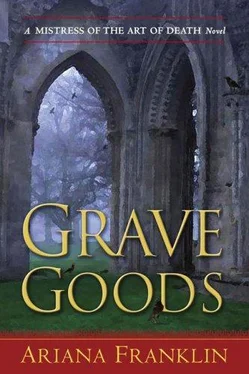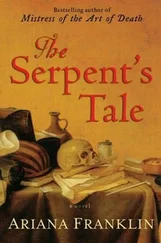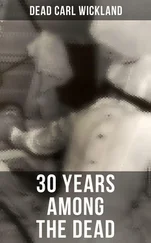Adelia heard Hilda’s voice mutter something and Rowley’s, forced, granting her forgiveness in the name of his God.
Lazarus was close now, and Adelia could see why it imprisoned those on it. The Brue was becoming sluggish, oozing between rises of sand that buttressed the higher ground of the island, each with a pool at its lowest point. Sphagnum moss, that wonderful bandage for septic wounds, grew in plenty like a mat.
But there was no health here. The mats quivered and stank of rotting vegetation; the quicksand beneath them slurped as if an old man was sucking his teeth.
And… “Oh, no, look,” Adelia said.
A stag was floundering in one of the mats. Its front hooves thrashed at the moss and the sand beneath it. The antlered head turned this way and that as it tried to raise its lower body from the morass. It was bellowing in distress.
“Help it, can’t we help it?”
The abbot looked to Godwyn. “Can we help it?”
The man shook his head. “No.”
“We can pull it free,” Adelia begged.
“Too heavy,” Godwyn said. “The sand… it sucks, like. Increases weight tenfold. Be like dragging a house. That’d take us with it.”
“It’ll suffocate.” It was unbearable to watch, to listen to.
“No,” Godwyn said again gently. “He’ll not go down further. He’s floating, and he’ll go on floating. ’Tis high tide today-we’re in the estuary now, see. Then he’ll drown, poor creature. ’Tis the easier death.”
Adelia didn’t think so. Neither did the stag. They could still hear it bellowing as they rounded the island and approached a long jetty.
Beyond was a compound no less neat than a country village, with houses of wattle and daub thatched with reed. There were gardens, and fields containing cattle and sheep, a little stone church with a bell tower. Whatever else he’d done, Abbot Sigward had made his lepers as comfortable as he could.
Somebody was ringing the church bell, and people were coming down to the landing stage, shouting a welcome to the abbot.
Rowley turned to Adelia. “They don’t look like lepers.”
At this distance, they probably didn’t, Adelia thought. Some would still be ambulatory and able to work; others would not be lepers at all but were condemned to spend their lives here because of their contact with the disease.
Whatever they were, neither Emma nor Roetger, nor Pippy, was among them. But there were children. Oh, God, there were children…
“Children?” she heard Rowley ask.
“Indeed,” the abbot told him brightly. “The Church would have lepers lead lives of chastity, and I am not supposed to perform marriages, but I do. And baptisms. I have learned the value of human as well as godly love.”
Like their houses, the people waiting for them on the landing stage were well accoutred though, differing from ordinary villagers, they were mostly dressed in uniform black with wide-brimmed hats not unlike a pilgrim’s. As the punt drew in and Godwyn tied up, carefully locking its hawser to a bollard, they crowded forward to help Abbot Sigward out, embracing him, kissing his hands, talking, some trying to pull him toward their houses to bless the sick that lay inside.
Anxious and distressed though she was, the scientist within Adelia saw the early signs on some of them: thinness from loss of appetite, twisted hands, blotches and eruptions on their faces, but even these were energized out of leprosy’s inevitable lassitude by the coming of the abbot.
If it hadn’t been for Emma, she’d have liked to question and examine. What was leprosy? Was it passed down from parent to child? Why did some catch it and others did not? Which conditions encouraged it, and which didn’t?
As it was… “Where are my friends?” she asked Godwyn sharply.
Rowley was grimacing at the sight of the people above him and scrambled ashore reluctantly to join Godwyn and Adelia on the landing stage, taking care to keep away from the crowd around Sigward.
Hilda remained kneeling on the floor of the punt, her head on the thwart the abbot had sat on, her eyes open and staring at nothing. “Back in a minute, sweetheart,” her husband told her. She didn’t move.
Leaving the abbot to the lepers, Rowley and Adelia followed Godwyn along the dirt track through the hamlet-except that now any resemblance to a normal village was gone. The people propped up against their doorways in the sun were not gossiping or weaving or tending to their children; they were being eaten alive, the disease chewing their flesh like a rat gnawing at a corpse. They had the dreadful similarity to one another that advanced leprosy gave to their faces, turning them lion-like.
The loss of feeling in their extremities, so that some had accidentally burned themselves or suffered cuts without knowing it, contributed to the absence of fingers and toes that necrosis had caused to drop off. One blind, bare-legged old man was unaware that a seagull was pecking at the stump of his foot.
Adelia shooed it off and, stooping, covered his legs with a flap of the blanket he sat on. Rowley pulled her away. “For God’s sake, don’t touch him. You can’t do anything.” He hurried her on.
Everything in Adelia screamed for her to do something, but she knew from what her foster father had told her of the disease that while opium could relieve pain in the early stages, these sufferers were beyond that; they must die slowly, inch by inch. Nothing was spared them, not even the stink from their rotting flesh.
“The firstborn of death.” Rowley was quoting from the Book of Job.
Little wonder the Church maintained that these people would not go to hell when they died; they were in it while they lived. From one of the cottages came a mumbled cry for water, whether from a man or a woman it was impossible to tell. A little girl came out with a pail and went running to a pump. That would do no good, either; the thirst at the end was inextinguishable.
They were beyond the village now, with a view of the far-off sea. The tide was coming in, refreshing the marshes and the air as if it wanted to wipe their memory of what they’d seen and smelled.
Let there be one good thing in this world, Adelia thought. Let Emma and Pippy be alive. Roetger, too. “Where are they?”
Godwyn pointed ahead to where a grove of low trees sheltered a shepherd’s hut. “Didn’t want ’em near the lepers, did I?” he said.
Adelia broke into a run, scattering sheep as she went. Thank God, thank God, a thin filament of smoke was rising from a cooking fire.
There was a stream and a small, dirty child in rags building a dam across it with twigs. Adelia jumped the stream and scooped him up as she ran, covering him with kisses.
A scarecrow of a woman appeared at the door of the hut, shading her eyes, then dropped to her knees like a puppet whose strings were suddenly cut.
Adelia scooped her up, too, nearly squashing Pippy in the process. “It’s all right now, Em, my dear, my dear girl. It’s going to be all right.”
OF THE THREE CASTAWAYS, Roetger was in the worst condition, emaciated and with a fever. “He’s been so brave, ’Delia,” Emma said, crying. “We would have died without him.”
He had to be supported on the journey back to the landing stage, using a crutch under one shoulder and Rowley on the other side. Godwyn offered to help, but Emma spat at him. “Don’t you come near, don’t you come near us.”
“Godwyn saved your lives,” Adelia told her gently.
“I don’t care. Keep him away.”
What the landlord was able to do was steer them around the village so that they could approach the punt from another side and avoid the sights of the main street. They were taking a track that led past the backs of cottages when a scream came from the direction of the landing stage.
Читать дальше












